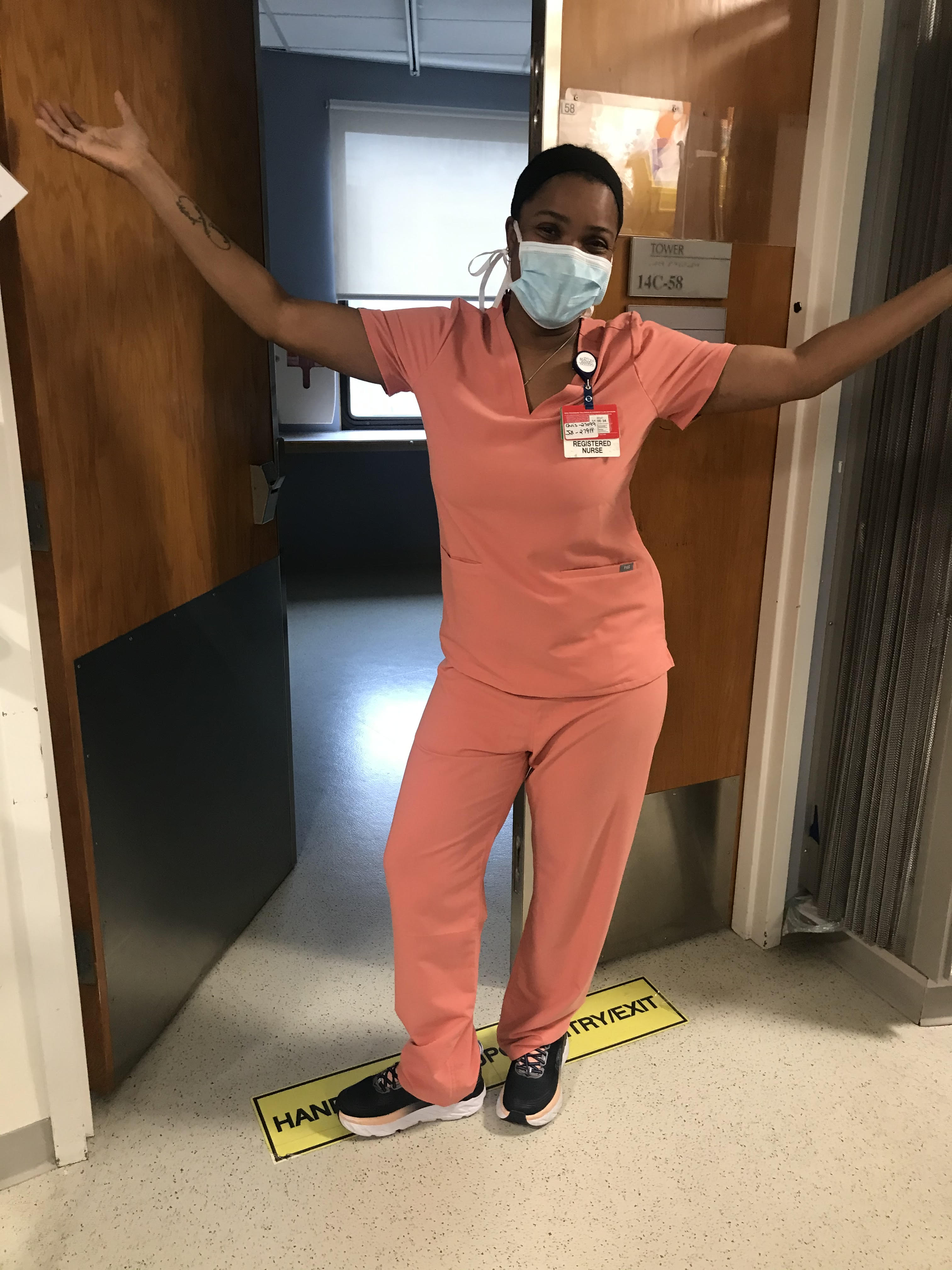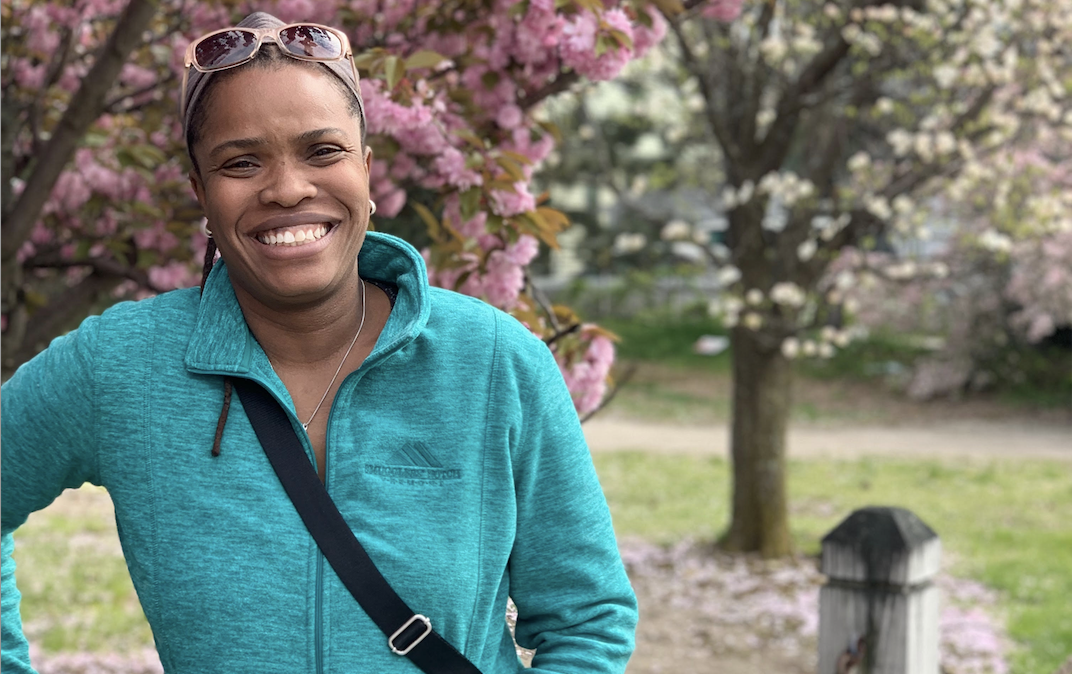“Don’t let other people’s perceptions define who you are. I found happiness, and that’s what saved me.”
Daphnee Souvenir, MSN, RN (Boston, MA)
Daphnee Souvenir was 15 when the deteriorating political climate of Haiti forced her to leave, and she landed in the big city of New York. She attended college, received her degree as a Medical Assistant, and landed her first job as a Medical Secretary. Her bright smile and soft Caribbean accent made her a favorite with hospital staff and patients alike. Daphnee realized the affection was mutual, and she wanted to be closer to the patients at the bedside. She got her second degree in nursing in 2004 and found her home at Brigham and Women’s Hospital in Boston, Massachusetts. “I’ve been a nurse for 16.5 years right now. I’m currently the Clinical Nurse in Charge overseeing 15 beds, 5 nurses, and 2 PCs on a medicine unit.” When the pandemic hit, procedures changed dramatically for Daphnee’s team. “Prior to the pandemic, we never wore masks unless patients had flu or tuberculosis. Now we had to wear properly sealed N-95 masks, goggles, gloves and extra gowns.”
Even with all the protections, nurses tested positive for COVID-19. No one knew if they contracted the disease at the hospital or at home. “It took a toll because you would be working one day and the next day discover someone had COVID. You were always in suspense; there was always the anxiety of exposure.” Her hospital decided to rotate teams into the COVID ward for 3 months at a time to control exposure, provide stability and eliminate fatigue. All units within the hospital rotated staff to care for the COVID-19 positive patients and it was my unit’s turn because of our experience with co-morbidity. Many COVID patients had other co-morbidities like high blood pressure, end-stage renal disease, etc. which Daphnee’s unit cares for on a regular basis in her medicine unit. The stress of being in a COVID ward and worrying about contracting the disease was high, but there was another element that rocked Daphnee’s unit to the core.
“What shook me up during COVID was George Floyd.” Daphnee recalls the tragic murder of Mr. Floyd and the escalation of the Black Lives Matter movement which increased microaggressions from patients at her predominantly white hospital. “I was shocked. Like wow. So you’re struggling to breathe, but you still demand to have (a nurse) who looks like you?” She and other nurses of color were challenged on their ability to provide care, their credentials, and where they went to school. “Patients are sick. You’re at the bedside. You’re holding their hand, and these sick patients still question you. It was heart-wrenching.”

Daphnee was privileged to work for a hospital director who was supportive of professionals of color and intolerant of discrimination. Her Director called the staff into a meeting and said very clearly, “We are a diverse organization, and this behavior will not be tolerated.” Daphnee took the reinforcement and led her team to put up a united front to preserve the integrity of their unit. “We discovered how strong we could be when we worked as one. If someone came in and said, ‘I don’t like this nurse. Give me another nurse,’ we said no. This is your nurse.” Daphne protected the other nurses, and the nurses in her unit supported her as their leader. “I want my staff to know they can come to me. It feels great because they know they can trust me. Our goal is to take care of the patient. I’m able to be the professional and not let hatred or racism stop me from doing that job.”
Daphnee has had to deal with ignorance and intolerance in her personal life as well. When her marriage ended after 16 years and 2 beautiful daughters, Daphnee realized she was attracted to women. “I was 36 and unhappy. I knew it would mean a big change in my life as a Haitian because West Indian people don’t embrace the (gay) lifestyle.” Her family scorned her, but Daphnee knew she had found her truth. The situation worsened when her adult daughter came out as bisexual. “People blamed me, but I had to tell them, it’s not contagious.” Twelve years ago, Daphnee met the woman who eventually became her wife. They’ve been married 6 years and have an energetic 4-year-old son. “My son provided relief from the pandemic. We were potty training and sleep training, and we were happy to have the distraction.” Daphnee stresses the importance of following your heart in all of life’s choices. “Don’t let other people’s narrow-minded mentality define who you are. I found happiness, and that’s what saved me.” Daphnee credits her wife as her greatest supporter. “She gave me the strength to get through COVID and championed me through nursing school.”
Daphnee completed her master’s degree as a Clinical Nurse Leader in December, and April she will begin a new role as Assistant Nurse Director of the Medicine Division. “I love nursing, and this is a great organization. There’s always room for growth.” Though she loves being at the bedside, her goal is to follow in the footsteps of the wonderful leaders at her hospital and become a Nurse Director at Brigham. “We may never, ever go back to the way things were prior to the pandemic, but that may be a good thing.”
#FirstRespondersFirst Microstep
Find a workmate who makes you feel safe and try to briefly connect with them each day.
This might be a friend, your supervisor, or simply a colleague with a particularly grounding presence. When you feel upset or stressed, it’s important to share your emotions with someone you trust.
Daphnee’s story is part of “Unmasked: Profiles of Humanity and Resiliency,” a collection of stories from the frontlines published by the National Black Nurses Association (NBNA) in partnership with #FirstRespondersFirst. The NBNA offers therapy and wellness services through RE:SET, a free mental wellness program developed for Black nurses to help them RE:SET, recharge and widen their circle of support. Visit nbnareset.com to learn more.


